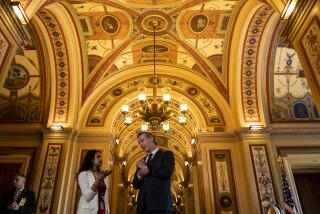Gov. Schwarzenegger’s speech won’t include policy agenda
SACRAMENTO — Describing California’s monumental budget deficit as “a rock upon our chest,” Gov. Arnold Schwarzenegger broke from tradition in his State of the State address Thursday with a blunt vow not to advance any policy agenda this year before resolving the state’s fiscal crisis.
As lawmakers sat before him in the Assembly chamber, Schwarzenegger said they had put their partisan beliefs above the interests of Californians, and he asked them to forgo their own salaries if they fail to pass the next budget by the deadline in June.
The speech is an annual rite in which governors normally lay out a list of their accomplishments from the preceding year and their grand aspirations for the new one. Schwarzenegger, giving the sixth and next to last address of his tenure, said he had such a set of proposals sitting on his desk, where for now they will stay.
His expression was serious, and his remarks were short, lasting less than 10 minutes.
“Addressing this emergency is the first and most important and greatest thing that we must do for the people of California,” Schwarzenegger said. “The $42-billion deficit is a rock upon our chest, that we cannot breathe until we get it off. It doesn’t make any sense for me to . . . stand in front of you and talk about education or infrastructure, or water, or healthcare reform and all those things when we have this huge budget deficit.”
Referring to the hope for change that he said the nation has conveyed in electing Democrat Barack Obama as president, the Republican governor said, “Californians, of course, desire change here in their own state as well. Yet they have doubts if that is possible.”
Lawmakers reacted with silence to Schwarzenegger’s plan for them to give up their salaries, though a few chuckled when he then called it “a brilliant idea.” After the speech, they gave him polite applause and he left quickly through a side door, eschewing the glad-handing that typically follows.
Legislative leaders from both parties agreed with Schwarzenegger’s message of coming together.
“This is not a time for finger-pointing, for arguing who is to blame,” said Senate President Pro Tem Darrell Steinberg (D-Sacramento). “We want to reassure Californians that we are going to solve this problem.”
Assembly Republican Leader Michael Villines of Clovis said the historic nature of the situation left no room to focus on anything else. “Republican, Democrat, Independent, Green, whatever you are -- it doesn’t matter,” he said.
Elsewhere, reaction broke along familiar fault lines. Business owners backed the governor’s proposal to cut lawmakers’ pay. Union members protested outside the Capitol and in Los Angeles about his plan to force state workers to take unpaid time off. Service providers spoke out against program reductions.
“Cutting crucial health and human services for the poor while demand for those services skyrockets during this recession is simply the wrong approach to solving the financial crisis,” Jeffrey Luther, president of the California Academy of Family Physicians, said in a statement.
The governor’s decision to devote his entire address to the financial crisis was a practical one. With the current budget already billions of dollars in the red, the state has no money for his visions of universal healthcare and new education programs, and he has proposed drastic cuts in those areas.
The deficit projected by the middle of next year is three times the size it was a year ago.
“People are asking if California is governable,” Schwarzenegger said. “They don’t understand how we could have let political dysfunction paralyze our state for so long.”
State officials are expected to run out of cash to pay bills in coming weeks, possibly forcing them to issue IOUs and delay tax refunds if Schwarzenegger and lawmakers are unable to break a stalemate in negotiations. The governor released his proposed budget for the next fiscal year on Dec. 31.
Noting that the crisis had forced state construction projects to halt last month, costing thousands of jobs during a recession, the governor asked, “How could we have let something like this happen?”
Though Schwarzenegger spoke generally of the gridlock in state government, he took special aim, as he has in recent months, at state lawmakers. He has laid most of the blame for the state’s current plight on their shoulders, although this month he vetoed a Democratic proposal to solve part of the problem.
He said the Legislature had been engaged for years in a “civil war” in which “the needs of the people became secondary.”
“Conan’s sword could not have cleaved our political system in two as cleanly as our own political parties have done,” he said, in a customary allusion to one of his movies.
His only specific proposal was for lawmakers and the governor to give up their salaries and daily expense payments if they fail to approve a budget for the next fiscal year by the June 15 deadline.
“I mean, if you call a taxi and the taxi doesn’t show up, you don’t have to pay the driver,” he said.
He then tried to lighten the mood: “I thought that this line would get a great applause in this hall, but I understand why not.”
Schwarzenegger, who has immense personal wealth, does not take a salary or expenses. State Sen. Dean Florez (D-Shafter) said the governor ought to make a sacrifice by giving up his frequent jet flights between the Capitol and his home in Los Angeles.
“It’s really the luxury of the super-wealthy to ask others to give up their pay,” Florez said in a statement.
Assembly Speaker Karen Bass (D-Los Angeles) quipped, “Maybe he would be willing to share his royalties.”
Schwarzenegger, who characterized ongoing talks as “good-faith negotiations,” is advocating a combination of tax increases, spending cuts and legislation that he says will jump-start public building projects by exempting some from environmental review and allowing private-sector companies to enter construction deals with government agencies.
Democrats are seeking tax increases as well, but fewer spending cuts. Republican lawmakers would only pare spending and have been blocking any tax hikes.
In urging lawmakers to bridge their differences, the governor suggested they follow the example of California firefighters who battled more than 2,000 wildfires last year and even died putting the blazes out. He said it would take courage -- “political courage” -- to make unpopular but necessary decisions.
“Now of course no one wants to take money from our gang-fighting programs or from Medi-Cal or from education,” the governor said. “No one wants to pay more taxes or fees. But each of us has to give up something.”
--
Times staff writer Eric Bailey contributed to this report.
More to Read
Get the L.A. Times Politics newsletter
Deeply reported insights into legislation, politics and policy from Sacramento, Washington and beyond. In your inbox three times per week.
You may occasionally receive promotional content from the Los Angeles Times.










